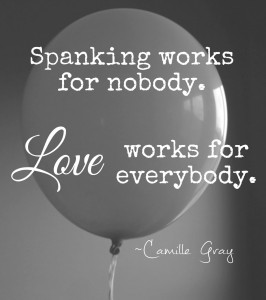 I recently came across a social media post that opened with the following phrase: “Have to laugh at people who are against spanking.” The post stated that spanking leads to a child learning respect and boundaries with the absence of any trust issues and hatred toward the parent, and so on and so forth. It concluded with: “Repost if you got your butt smacked and survived.” I couldn’t disagree more. My feelings were a mixture of appall, irritation and sadness. And no, I didn’t feel like laughing at anyone!
I recently came across a social media post that opened with the following phrase: “Have to laugh at people who are against spanking.” The post stated that spanking leads to a child learning respect and boundaries with the absence of any trust issues and hatred toward the parent, and so on and so forth. It concluded with: “Repost if you got your butt smacked and survived.” I couldn’t disagree more. My feelings were a mixture of appall, irritation and sadness. And no, I didn’t feel like laughing at anyone!
In the role of parents, we are our children’s first and most important role models. We are our children’s leaders, their advocates. When leaders say one thing but do another, they do erode trust — an essential element of productive leadership. I believe that the most effective teaching by a parent is accomplished by setting a positive example for the child to witness and learn from.
Actions are more powerful than words, and our kids observe us conduct ourselves in this world. Whether we offer help to an elder crossing the street, are courteous to the cashier at the supermarket or show respect to our own parents — whether we shout profanities at our fellow drivers, mistreat those who work for us, or bad-mouth our family and friends — each of our actions signal to our kids what is appropriate and acceptable behavior.
 When we spank our child as a consequence of unwanted behavior, what are we communicating to that child? What are the messages that child may be sensing? We teach him — by our own example, through our actions — that it’s acceptable to manage anger and discontent with violence. Furthermore, we may be encouraging a cycle of violence as we are providing him with improper tools to handle his anger and other intense emotions.
When we spank our child as a consequence of unwanted behavior, what are we communicating to that child? What are the messages that child may be sensing? We teach him — by our own example, through our actions — that it’s acceptable to manage anger and discontent with violence. Furthermore, we may be encouraging a cycle of violence as we are providing him with improper tools to handle his anger and other intense emotions.
There are many adults who were physically punished as children and are supportive of physically punishing their children, reasoning that they “survived.” The above-mentioned post has more than 24,000 likes, and that number keeps growing. To them I say:
- Good for you that you survived!
- Most of us don’t want to simply “survive” in this life. We want to thrive!
- Children can be damaged in many ways and spend much of their adult life untying the knots their parents had created for them — unleashing themselves from all the pain and humiliation inflicted upon them at an innocent, young age.
- I have to keep in mind that many people lack personal introspection and insight.
It isn’t easy being a parent. It is blissful and rewarding, but it is also challenging and exhausting. Once my second child became a toddler, I thought I crossed my biggest parenting hurdle: 5 years of sleepless nights and the suffocating dependency. I’m now realizing, I crossed a moderate hurdle, only to face the biggest one — thus far — namely, disciplining! With one of my kids being strong-minded and defiant, I have experienced fury and other emotions I wasn’t aware existed in me. I am flawed; I crossed the line I set twice — not my proudest moments by any stretch of the imagination. I have ample sympathy for parents who struggle with discipline — every single day!
There is overwhelming evidence that physical punishment is both ineffective and harmful to child development. Instilling fear in children serves no purpose and creates feelings of shame and humiliation. Fear has been shown to lead to an increased risk of future antisocial behavior, including crime and substance abuse. Studies show that spanking and other physical punishment techniques can create ongoing behavioral and emotional problems. Harsh, physical punishment teaches children that violence is the only way to solve problems. Furthermore, controlling or manipulative discipline compromises the trust between parent and child, and harms the attachment bond. You can read more on about Attachment Parenting International‘s Seventh Principle of Parenting: Practice Positive Discipline.
In any event, I don’t need experts or studies to tell me that inflicting physical pain on my kids is wrong, on so many levels — I view it as common sense. The key principle I impart on my kids is: “Treat others the way you would like to be treated yourself.” It’s fundamentally the way I would like my kids to carry themselves in our home as well as in the world. Hence, I don’t hit my kids — spanking is just a label for a form of hitting — as I don’t enjoy being hit myself.
Needless to say, the parent is the authority figure in the family, but that still doesn’t justify acts of aggression.
We don’t exist in a Utopian world and there are the occasions when — sadly — aggression and violence are necessary in society, but this is another conversation. But aggression and violence does not have a place in the home: the one place children ought to feel secure, loved and protected — not shamed, not humiliated.
The goal of discipline — the word’s Latin root meaning “to teach” — is to change behavior. It’s a sign of strength to examine ourselves and our parenting approaches, striving to improve and evolve. So, let’s lead our kids and teach them to adjust their behavior with a gentle approach and maybe, just maybe, we the parents need a dose of discipline, too.
 Yet, this increasingly disproved child-raising practice remains legal in all 50 U.S. states with 19 states allowing physical punishment in schools. American children are far from an isolated group – 63% of children ages 2-4 worldwide are regularly subjected to physical punishment by parents or other caregivers.
Yet, this increasingly disproved child-raising practice remains legal in all 50 U.S. states with 19 states allowing physical punishment in schools. American children are far from an isolated group – 63% of children ages 2-4 worldwide are regularly subjected to physical punishment by parents or other caregivers.

